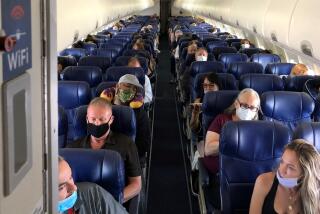Hard Challenge on Airline Safety
- Share via
If the president, Congress, the aviation industry and the public pull together for airline safety, travelers can enjoy more peace of mind and greatly heightened security.
That’s the challenge raised by Vice President Al Gore’s commission on air safety and security, formed at the order of President Clinton after the July 25 explosion of TWA Flight 800, a disaster whose cause still eludes investigators.
The recommendations. Most are reasonable and deserve a close look. They include new assessments of the security vulnerability of all U.S. airports, along with plans to address deficiencies; deployment of the latest in bomb-detection technology to screen baggage and passengers; wider use of bomb-sniffing dogs; tighter screening and training of airline and airport personnel, and regular testing of the procedures.
Other proposals put forward by the Gore commission include improved and computerized passenger profiling to identify suspicious persons or activities. Quick checks on possible criminal and fingerprint records for all employees with access to airliners are recommended. Thorough baggage checks would be mandatory. Beyond U.S. borders, the panel urges anti-terrorism training at selected overseas airports.
The FBI would be given a bigger role in anti-terrorism activities, and primary responsibility for family notification in air disasters would be shifted from the airlines to the National Transportation Safety Board.
Costs and cooperation. Gore says that the airline industry cannot and should not foot the bill alone. Toward that end, his commission recommends that the president ask Congress for $300 million in supplemental funding for the bolstered security program. The General Accounting Office has estimated costs at $400 million to $2.2 billion. To achieve such funding goals, bipartisan action will be required in Congress, and lawmakers should see that this cooperation is mustered.
Technology and public/private partnerships. Current bomb detection technology is not up to the task that the commission and the public are demanding in the wake of the TWA disaster and others. The commission report, disclosed Thursday, suggests public/private partnerships to spur research and development and speed production to place state-of-the-art equipment in the nation’s airports.
All these findings and suggestions point to the promise of security and safety on a scale never attempted before by an open society, certainly not in peacetime. The importance of this challenge cannot be discounted, nor its goals rashly approached. Washington and corporate and private America should push this program through. Never again should we have to look back from an air disaster and say not enough was done.
More to Read
Sign up for Essential California
The most important California stories and recommendations in your inbox every morning.
You may occasionally receive promotional content from the Los Angeles Times.










